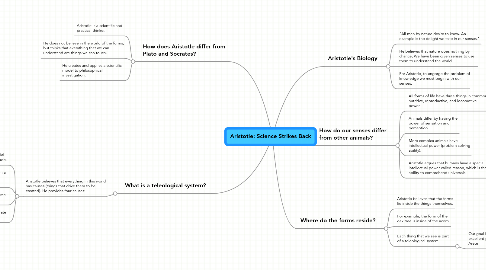Aristotle: Science Strikes Back
par Liann Tucker


1. How does Aristotle differ from Plato and Socrates?
1.1. Aristotle is a scientific and practical thinker.
1.2. He does not believe in the world of the forms, but thinks that everything that we can understand are things we can touch.
1.3. He creates and applies a scientific model to philosophical investigation.
2. What is a teleological system?
2.1. Aristotle believes that everything in this world has causes (things that drive them to be created). He provides four causes:
2.1.1. Material cause: The material from which the thing is made.
2.1.2. Formal cause: The shape or form a thing must take in order to be recognized.
2.1.3. Efficient cause: The actual force used to make the thing.
2.1.4. Final cause: What's the ultimate purpose of the thing.
3. Aristotle's Biology
3.1. "All men by nature desire to know. An example is the delight we take in our senses."
3.2. He believes that nature does nothing by chance, We have been given senses to use them to understand the world.
3.3. For Aristotle, to engorge the problem of knowledge we must begin with our senses.
4. How do our senses differ from other animals?
4.1. All forms of life have three things in common: nutritive, reproductive, and locomotive power.
4.2. Animals differ by having the power of sensation and perception.
4.3. More complex animals have intellectual power (problem solving ability).
4.4. Aristotle argues that humans have a special intellectual power called reason, which is the ability to comprehend universals.
5. Where do the forms reside?
5.1. Aristotle believes that the forms lie inside the things themselves.
5.2. For example, the form of the oak tree is inside of the acorn
5.3. Each thing that we see is part of a teleological system.
5.3.1. Our goal is to be a morally excellent person who is virtuous- Arete
